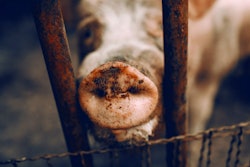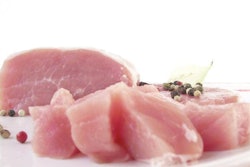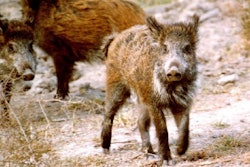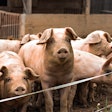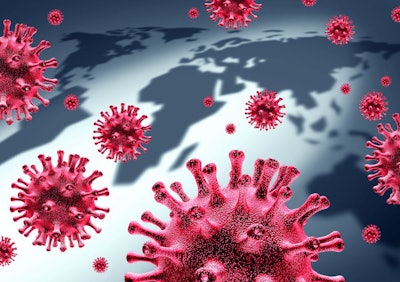
CEO Juan Luciano says he is optimistic about his company’s position despite challenges brought about by pandemic
Diversification and adaptability have kept executives at Archer Daniels Midland Co. (ADM) optimistic throughout the novel coronavirus (COVID-19) pandemic.
The company took action early with strong leadership at the beginning of the pandemic and is looking ahead and planning for life after it.
“Our team has made an exceptional effort to keep our company safe and to keep our company running, and also we’re planning for life post-COVID-19 and what that transition looks like,” said Juan Luciano, chairman and CEO of ADM, during the BMO Capital Markets Global Farm to Market Conference on May 13. “When it became clear that COVID presented a growing risk both to our colleagues and our operations, we activated our global pandemic leadership team that meets every day … to review new information, evaluate risks and make timely decisions to protect our teams and our business.”
ADM put strict guidelines into place early on, Luciano said, including travel requirements and social distancing. He said the company is maintaining safe and efficient operation and that all of its 800 facilities worldwide are up and running, with many employees working remotely.
“If you would have asked me six months ago, ‘Can we operate a complex company like this remotely?’ I would have doubted,” he said.
Now, the company is planning for a “post-COVID transition” by developing protocols for re-entry into the workplace.
“We have the benefit of being a global company,” Luciano said. “We’ve seen the evolution of the virus from east to west, so we have, now, the teams in China back into work 100% and we have used all those learnings to improve our protocols. We have very strict protocols; we will be slow in our re-entering because, to be honest, we are operating successfully as we are today. We don’t want to lose the gains that we have made in that regard.”
Momentum before the pandemic
Despite the pandemic, Luciano said ADM had a strong first quarter, with some challenges in late March and early April. He said that was when the company saw its biggest declines of the pandemic, but it has seen some improvements in the past two to three weeks.
“We were coming very strongly with a lot of momentum into COVID,” he said. “First quarter was truly outperformance by the business itself and we haven’t seen a big letdown as we go into April, so I think the strength will continue there.”
The biggest impact on business, he said, was in the foodservice sector, but he is optimistic as business starts to return.
Along with the downturn in foodservice, ethanol and meat packing plant shutdowns have affected ADM’s oilseeds crushing business.
“Our expectation for soybean meal demand growth in the U.S. is a little bit lower than it was in January … but we think this a just a temporary effect,” he said, adding that the company ran very high oilseeds crushing capacity in the first quarter and have since adjusted that down.
However, he said, soybean meal and crush margins in China are good due to hog herd rebuilding from African swine fever (ASF).
Changing consumer demand
As some regions around the world begin to emerge from lockdown, ADM is evaluating changing consumer demand.
“Demand is changing weekly as customers are trying to adapt and to make the shift from foodservice to retail,” Luciano said. “We’re also analyzing consumer behaviors. As regions of the world start to reopen – how consumers come back. What is the mindset of consuming coming back to more normal?”
He said there is still a protein imbalance in China driven by ASF, and Vince Macchiocchi, senior vice president and president of nutrition at ADM, said livestock demand is strong in some regions of the world.
“There is some decreased demand for livestock in the U.S., but with our geographic footprint and diversity of our portfolio, a couple of things: There still is some increasing livestock demand in parts of Latin America and Mexico and particularly in Asia-Pacific and Southeast Asia when you think about the Philippines,” Macchiocchi said. “There are still some livestock opportunities, but I think the other thing that helps the animal nutrition portfolio, and a primary driver as to why we acquired Neovia, is really the breadth and depth of that portfolio.”
ADM acquired Neovia in early 2019, as part of its plan to become a global leader in value-added products and solutions for production and companion animals.
“When we acquired Neovia, what we said very clearly was that Neovia was a ‘margin-up’ story,” Luciano said. “That’s where we saw the opportunity to margin up to our 9% first and then take probiotics and all these other products and improve the product mix and take it even further.”
Macchiocchi said ADM aims to have the kind of success it has seen in its human nutrition sector in its animal nutrition sector.
“Essentially what we’re trying to do in animal is follow a blueprint that we developed in the human nutrition side in terms of really valuing up the business,” he said.
Other companies that gave presentations at the BMO Capital Markets Global Farm to Market Conference included Tyson Foods and Sanderson Farms.
View our continuing coverage of the novel coronavirus (COVID-19) pandemic.


